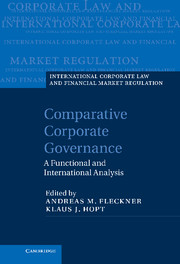Book contents
- Frontmatter
- Contents
- Contributors
- Preface
- Abbreviations
- Part I General report
- Part II National reports
- A Australia and Asia
- B Europe
- 6 Austria
- 7 Belgium
- 8 Denmark
- 9 Finland
- 10 France
- 11 Georgia
- 12 Germany
- 13 Hungary
- 14 Luxembourg
- 15 Netherlands
- 16 Norway
- 17 Poland
- 18 Portugal
- 19 Spain
- 20 Switzerland
- 21 United Kingdom
- C The Americas
- Part III Annex: Questionnaire
- Index
- References
19 - Spain
Listed companies' governance
from B - Europe
Published online by Cambridge University Press: 05 July 2013
- Frontmatter
- Contents
- Contributors
- Preface
- Abbreviations
- Part I General report
- Part II National reports
- A Australia and Asia
- B Europe
- 6 Austria
- 7 Belgium
- 8 Denmark
- 9 Finland
- 10 France
- 11 Georgia
- 12 Germany
- 13 Hungary
- 14 Luxembourg
- 15 Netherlands
- 16 Norway
- 17 Poland
- 18 Portugal
- 19 Spain
- 20 Switzerland
- 21 United Kingdom
- C The Americas
- Part III Annex: Questionnaire
- Index
- References
Summary
General information on corporate governance
Definition of corporate governance in the reglas de buen gobierno corporativo
The growing importance of listed stock market companies, together with certain accounting and financial scandals that affected not only Spanish but also major stock markets, are factors that have propelled a wide movement to analyze and reconsider the tasks and functions of the board of directors in listed stock companies regarding stakeholders' interests. The main reasons underlying gobierno corporativo in Spain – also known as reglas de buen gobierno corporativo – are similar to those worldwide. Through the gobierno corporativo policies, references are set to ensure and preserve confidence in capital markets. To do so, corporate governance rules tend to create and implement new structures and company government mechanisms to ensure protection for small shareholders' interests and to increase and preserve investors' confidence in capital markets. The approach of Spanish best practice codes to corporate governance has so far mainly been to adopt a narrow definition of corporate governance. However, this last tendency is changing as corporate social responsibility issues are beginning to frame directors' and officers' duties. Through corporate governance best practice recommendations, rules are set on the functioning of the board of directors, its relations to management, positions of management, and some other issues resulting from relations between those who hold governing duties in listed companies and shareholders and other listed companies' stakeholders. Therefore, codes are presented as multipurpose instruments to support investors' and shareholders' expectations and rights, to increase management performance, to protect directors against criticism and liability, and to support firms' stability.
- Type
- Chapter
- Information
- Comparative Corporate GovernanceA Functional and International Analysis, pp. 822 - 867Publisher: Cambridge University PressPrint publication year: 2013

